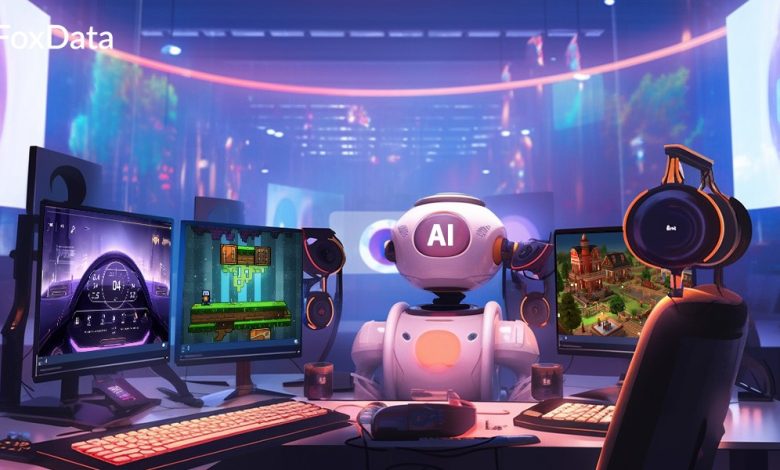The Rise of Artificial Intelligence in the Gaming Industry
A Glimpse into the Future of Immersive Gameplay

Introduction
The Future of AI in the Gaming Industry:
Artificial intelligence (AI) has long been a driving force in the gaming industry, shaping everything from character behavior and game design to procedural generation and player interaction. As AI technology continues to advance at a rapid pace, the future of AI in gaming holds immense potential to revolutionize gameplay, enhance immersion, and create more dynamic and personalized gaming experiences than ever before. From intelligent NPCs and adaptive storytelling to procedural content generation and AI-driven game design, let’s explore how AI is poised to shape the future of the gaming industry.
The Future of AI in the Gaming Industry: Revolutionizing Gameplay and Immersion:
Artificial Intelligence (AI) is rapidly evolving, and its integration into the gaming industry is transforming the landscape of interactive entertainment. From intelligent NPCs and adaptive gameplay to procedural content generation and AI-driven game design, the future of AI in gaming holds vast potential to revolutionize gameplay, enhance immersion, and create more dynamic and personalized gaming experiences than ever before. Let’s delve into the exciting possibilities and implications of AI’s role in shaping the future of gaming.
Intelligent NPCs and Dynamic Gameplay:
AI-driven NPCs are poised to become more lifelike and responsive, enriching gameplay experiences with dynamic interactions and immersive storytelling. Advanced AI algorithms enable NPCs to adapt to player behavior, learn from their actions, and evolve over time, creating more engaging and unpredictable gameplay scenarios. Imagine exploring a virtual world populated by NPCs with their own personalities, motivations, and agendas, each contributing to the richness and complexity of the game world.
Adaptive Storytelling and Personalized Experiences:
AI-powered storytelling systems have the potential to revolutionize narrative-driven games by generating dynamic and personalized narratives that respond to player choices and actions. These adaptive narratives could offer branching storylines, multiple endings, and dynamically generated quests tailored to each player’s preferences and playstyle. As a result, players can enjoy more immersive and replayable storytelling experiences that evolve in response to their decisions and interactions.
Procedural Content Generation and World Building:
AI-driven procedural content generation enables developers to create vast, diverse, and infinitely explorable game worlds with minimal manual effort. By analyzing player feedback, gameplay data, and design parameters, AI algorithms can generate procedurally generated levels, environments, and assets that are both visually stunning and engaging to explore. This approach to world building offers unprecedented scalability, allowing developers to create expansive and dynamic game worlds that adapt to player actions and preferences.
AI-Driven Game Design and Development:
AI is increasingly being used to streamline the game design and development process, assisting developers in tasks such as level design, game balancing, and user interface optimization. AI-driven design tools analyze vast amounts of data to generate game prototypes, optimize gameplay mechanics, and improve player engagement. This not only accelerates the game development process but also enables developers to create more innovative, polished, and player-centric gaming experiences.
Enhanced Player Experience and Engagement:
Ultimately, the integration of AI into the gaming industry is aimed at enhancing the player experience and fostering deeper engagement with games. By creating more immersive, dynamic, and personalized gaming experiences, AI-driven games can captivate players for longer periods and encourage greater exploration, experimentation, and creativity. Whether it’s facing off against intelligent adversaries, uncovering hidden secrets in procedurally generated worlds, or experiencing personalized narratives that adapt to individual choices, players can look forward to a future of gaming that is richer, more immersive, and more rewarding than ever before.
Conclusion:
As AI technology continues to advance, the future of AI in the gaming industry holds boundless possibilities for innovation and creativity. From intelligent NPCs and adaptive storytelling to procedural content generation and AI-driven game design, AI is poised to revolutionize every aspect of the gaming experience. By harnessing the power of AI, developers can create games that are more immersive, dynamic, and personalized, offering players endless opportunities for exploration, discovery, and enjoyment. As we look ahead to the future of gaming, one thing is certain: AI will play a central role in shaping the next generation of interactive entertainment, pushing the boundaries of what is possible and redefining the way we play, experience, and interact with games.
Intelligent NPCs and Dynamic Gameplay:
One of the most impactful applications of AI in gaming is the creation of intelligent non-player characters (NPCs) that exhibit lifelike behavior, react dynamically to player actions, and contribute to immersive and engaging gameplay experiences. In the future, AI-driven NPCs could possess advanced decision-making capabilities, allowing them to adapt to changing circumstances, learn from their interactions with players, and evolve over time.Imagine a role-playing game where NPCs have their own personalities, motivations, and agendas, leading to dynamic and unpredictable interactions with the player. AI-controlled enemies could employ sophisticated tactics and strategies, challenging players to think creatively and adapt their approach to overcome obstacles. Additionally, AI companions could offer valuable assistance and support, providing meaningful companionship and enhancing the player’s sense of immersion and camaraderie.
Intelligent NPCs and Dynamic Gameplay: Redefining Interactive Experiences in Gaming:
Intelligent Non-Player Characters (NPCs) and dynamic gameplay represent pivotal aspects of modern gaming experiences, captivating players with rich narratives, immersive interactions, and unpredictable challenges. As Artificial Intelligence (AI) technology continues to advance, NPCs are evolving beyond scripted behaviors to become more lifelike, responsive, and adaptable, shaping dynamic gameplay scenarios that offer endless possibilities for exploration and engagement. Let’s delve into the intricate world of intelligent NPCs and dynamic gameplay, exploring their evolution, impact, and potential in shaping the future of interactive entertainment.
The Evolution of NPCs: From Scripted Behaviors to Lifelike Interactions:
In the early days of gaming, NPCs were often characterized by rigid, scripted behaviors, limited dialogue options, and predictable actions. However, advancements in AI technology have transformed NPCs into sophisticated virtual entities capable of simulating human-like intelligence, emotions, and decision-making processes.Modern NPCs are designed to exhibit a range of behaviors, personalities, and motivations, allowing them to respond dynamically to player actions, environmental stimuli, and emergent situations. Whether it’s engaging in conversation, navigating complex environments, or engaging in combat, NPCs are now capable of adapting their behavior in real-time, creating more immersive and believable interactions with players.
Dynamic Gameplay: The Art of Emergent Experiences:
Dynamic gameplay refers to the creation of game experiences that evolve and change based on player choices, actions, and interactions. This approach to game design embraces emergent gameplay, allowing for unpredictable outcomes, emergent strategies, and player-driven narratives that unfold organically over time. Intelligent NPCs play a central role in shaping dynamic gameplay experiences, serving as catalysts for emergent behaviors, evolving challenges, and dynamic storytelling. By responding dynamically to player actions and decisions, NPCs can influence the course of the game world, creating branching narratives, unforeseen consequences, and memorable moments that resonate with players long after the game is over.
The Impact of Intelligent NPCs on Gameplay:
Intelligent NPCs have a profound impact on gameplay, enriching the player experience with deeper immersion, enhanced challenge, and greater narrative depth. By simulating human-like intelligence and agency, NPCs create a sense of presence and believability within the game world, fostering emotional connections and meaningful interactions between players and virtual characters. Moreover, intelligent NPCs introduce new gameplay dynamics and strategic considerations, requiring players to adapt their approach, think critically, and make meaningful choices that shape the outcome of the game. Whether it’s forging alliances, negotiating conflicts, or navigating moral dilemmas, interactions with intelligent NPCs challenge players to explore new strategies, experiment with different playstyles, and immerse themselves fully in the game world.
The Future of Intelligent NPCs and Dynamic Gameplay:
As AI technology continues to evolve, the future of intelligent NPCs and dynamic gameplay holds limitless potential for innovation and creativity. From enhanced procedural generation and adaptive storytelling to more advanced AI-driven behaviors and player interactions, the possibilities for dynamic gameplay experiences are endless.In the years to come, we can expect to see even more lifelike and responsive NPCs, as well as increasingly dynamic and emergent gameplay scenarios that push the boundaries of interactive entertainment. By harnessing the power of AI, developers can create games that offer unparalleled depth, immersion, and replayability, ensuring that the future of gaming is filled with unforgettable experiences that captivate and inspire players of all ages.
Adaptive Storytelling and Personalized Experiences:
AI is also poised to revolutionize storytelling in games by enabling adaptive narratives that respond to player choices, preferences, and actions in real-time. In the future, AI-driven storytelling systems could dynamically generate branching narratives, multiple endings, and personalized quests based on player decisions, creating a truly interactive and immersive storytelling experience.For example, a narrative-driven game could use AI algorithms to analyze player behavior and preferences, adjusting the storyline, character interactions, and narrative twists accordingly. This would allow each player to experience a unique and personalized story tailored to their individual choices and playstyle, increasing replay value and player engagement.
Adaptive Storytelling and Personalized Experiences: Crafting Immersive Narratives in Gaming
In the ever-evolving landscape of gaming, adaptive storytelling and personalized experiences stand at the forefront of innovation, offering players immersive narratives that dynamically respond to their choices, actions, and preferences. As advancements in technology continue to push the boundaries of interactive entertainment, the intersection of storytelling and player agency is reshaping the way we experience games, providing deeper immersion, enhanced replayability, and a greater sense of personalization. Let’s delve into the intricate world of adaptive storytelling and personalized experiences, exploring their evolution, impact, and potential in shaping the future of gaming.
The Evolution of Storytelling in Gaming: From Linear Narratives to Dynamic Worlds
Traditionally, storytelling in games has followed a linear path, guiding players through predetermined narratives with little room for deviation or player agency. While these experiences have produced memorable and engaging stories, they often lack the depth and flexibility required to truly immerse players in the game world. However, with the advent of adaptive storytelling, developers are now able to create dynamic narratives that respond to player choices, actions, and interactions, resulting in more personalized and engaging experiences.
Adaptive Storytelling: Creating Branching Narratives and Meaningful Choices
Adaptive storytelling revolves around the concept of branching narratives, where player decisions and actions influence the direction and outcome of the story. This approach to storytelling allows for greater player agency, as players are empowered to make meaningful choices that shape the narrative, impact character relationships, and determine the fate of the game world.In adaptive storytelling, the choices players make have consequences that ripple throughout the game, leading to multiple branching paths, alternate endings, and unforeseen consequences. Whether it’s choosing between different dialogue options, deciding the fate of key characters, or determining the outcome of pivotal events, every decision players make has the potential to alter the course of the story, creating a truly personalized and immersive narrative experience.
Personalized Experiences: Tailoring Gameplay to Player Preferences
In addition to adaptive storytelling, personalized experiences in gaming involve tailoring gameplay to individual player preferences, playstyles, and skill levels. By analyzing player behavior, preferences, and performance data, developers can create more dynamic and engaging experiences that adapt to the needs and preferences of each player.Personalized experiences can take many forms, from dynamically adjusting difficulty levels and enemy behaviors to providing tailored challenges, quests, and rewards based on player progression and skill level. This approach to game design ensures that players are continually challenged and engaged, while also providing a sense of accomplishment and satisfaction as they overcome obstacles and achieve their goals.
The Impact of Adaptive Storytelling and Personalized Experiences
The impact of adaptive storytelling and personalized experiences on gaming is profound, reshaping the way we experience, interact with, and think about games. By giving players agency over the narrative and tailoring gameplay to their individual preferences, these innovations foster deeper immersion, emotional engagement, and player investment in the game world.
Moreover, adaptive storytelling and personalized experiences increase replayability, as players are encouraged to explore different choices, outcomes, and playstyles in order to uncover new content and experiences. This not only extends the lifespan of games but also enhances their value and appeal to a wider audience of players.
The Future of Gaming: Embracing Adaptive Storytelling and Personalized Experiences
As technology continues to advance, the future of gaming holds endless possibilities for adaptive storytelling and personalized experiences. From more sophisticated branching narratives and AI-driven character interactions to advanced player profiling and dynamic content generation, the potential for innovation and creativity is boundless.In the years to come, we can expect to see even more immersive, dynamic, and personalized gaming experiences that blur the lines between reality and fiction. By embracing adaptive storytelling and personalized experiences, developers can create games that resonate deeply with players, offering unforgettable journeys, emotional experiences, and meaningful connections that transcend the confines of the screen. As we look ahead to the future of gaming, one thing is certain: the era of personalized storytelling has only just begun, and the possibilities for innovation and creativity are limitless.
Procedural Content Generation and World Building:
Another area where AI is expected to have a significant impact is procedural content generation, which involves the automatic generation of game content such as levels, environments, and assets using AI algorithms. In the future, AI-driven procedural generation could enable the creation of vast, procedurally generated worlds that are richly detailed, diverse, and infinitely explorable.AI algorithms could analyze player feedback, gameplay data, and design principles to generate highly immersive and dynamic game worlds that adapt to player preferences and playstyle. This would allow for more efficient and cost-effective game development, as well as greater flexibility and scalability in creating diverse and engaging content.
AI-Driven Game Design and Development:
AI is also expected to play a crucial role in game design and development, helping developers streamline the design process, optimize game mechanics, and create more compelling and innovative gaming experiences. In the future, AI-driven design tools could assist developers in generating game prototypes, balancing gameplay systems, and optimizing user interfaces, allowing for faster and more efficient game development. Furthermore, AI algorithms could be used to analyze player feedback, playtesting data, and market trends to inform design decisions and iterate on game concepts iteratively. This would enable developers to create games that are more responsive to player needs and preferences, leading to higher-quality and more successful gaming experiences.
Conclusion:
As AI technology continues to advance, the future of AI in the gaming industry holds immense promise for revolutionizing gameplay, enhancing immersion, and creating more dynamic and personalized gaming experiences than ever before. From intelligent NPCs and adaptive storytelling to procedural content generation and AI-driven game design, AI is poised to reshape the way we play, experience, and interact with games in profound and exciting ways. As developers continue to push the boundaries of what is possible with AI in gaming, players can look forward to a future filled with immersive, innovative, and unforgettable gaming experiences that blur the lines between fantasy and reality.
Introduction to Artificial Intelligence in the Gaming Industry
Artificial Intelligence (AI) is revolutionizing the gaming industry, offering a glimpse into the future of immersive gameplay. As technology continues to advance at a rapid pace, AI is becoming a key component in the development of video games. By simulating human intelligence, AI brings a new level of realism, challenge, and interactivity to gaming experiences. In this article, I will explore the role of AI in gaming, its benefits, examples of its implementation in popular games, and the exciting potential it holds for the future.
The Role of Artificial Intelligence in Gaming
AI plays a crucial role in gaming by providing intelligent decision-making capabilities to non-player characters (NPCs) and enhancing game mechanics. NPCs are the computer-controlled entities that interact with players in the game world. With AI, NPCs can exhibit realistic behavior, adapt to different situations, and even learn from player interactions. This creates a more dynamic and immersive gaming experience, as players are no longer limited to predictable patterns of NPC behavior. Additionally, AI enables developers to create more challenging gameplay. AI-controlled opponents can analyze player strategies, adapt their tactics, and provide a greater level of competition. This keeps players engaged and motivated to improve their skills. The advancements in AI also allow for procedural generation, where game worlds, quests, and levels can be dynamically generated based on player choices and preferences. This adds a new level of replayability and customization to games, making each playthrough a unique experience.
Benefits of Artificial Intelligence in Gaming
The integration of AI in gaming brings numerous benefits to both developers and players. For developers, AI reduces the need for manual scripting of NPC behavior, saving time and resources. With AI algorithms, NPCs can make decisions on the fly, respond to player actions, and create more realistic and immersive virtual worlds. This enhances the overall quality of the game and allows developers to focus on other aspects of game design. From a player’s perspective, AI enhances the gaming experience by providing more intelligent and challenging opponents. Gone are the days of predictable enemy AI. Now, players can face opponents who adapt to their playstyle, making each encounter a thrilling battle of wits. AI also enables NPCs to provide meaningful and realistic dialogue, making the game world feel alive and responsive. Additionally, AI can assist players by offering in-game hints, tips, and tutorials, ensuring a smoother learning curve and a more enjoyable experience for both new and experienced players.
Examples of Artificial Intelligence in Popular Games
Several popular games have embraced AI and showcased its capabilities. One notable example is the game “The Witcher 3: Wild Hunt.” In this open-world RPG, NPCs exhibit complex behaviors, such as following daily routines, reacting to the player’s actions, and engaging in dynamic conversations. The AI-driven decision-making of NPCs creates a sense of realism and immersion, making the game world feel alive. Another example is the “F.E.A.R.” series, known for its advanced enemy AI. The AI-controlled enemies in these games adapt to the player’s tactics, communicate with each other, and use cover effectively. This creates intense and unpredictable combat scenarios, keeping players on their toes.
The Future of Artificial Intelligence in Gaming
The future of AI in gaming is incredibly promising. As technology continues to evolve, AI will become even more sophisticated, enabling developers to create even more immersive and realistic gaming experiences. One area where AI is expected to have a significant impact is in virtual reality (VR) and augmented reality (AR) games.
Challenges and Ethical Considerations in AI Gaming
While the rise of AI in gaming brings exciting possibilities, it also raises important ethical considerations. AI-powered NPCs can simulate human behavior to a remarkable extent, blurring the line between real and virtual worlds. This raises questions about player consent, privacy, and the potential psychological effects of interacting with AI entities. Developers must carefully navigate these challenges and ensure that AI is used responsibly and ethically in gaming.
How AI is Enhancing Immersive Gameplay
AI is revolutionizing immersive gameplay by creating more realistic and dynamic game worlds. With AI-powered procedural generation, game environments can adapt and evolve based on player choices and actions. This allows for endless possibilities and keeps players engaged for longer periods. Additionally, AI enhances the immersion factor by providing realistic non-player characters. NPCs can exhibit emotions, engage in realistic dialogue, and react to the player’s actions. This creates a more immersive and believable game world, where players feel truly connected to the virtual environment.
AI-Powered Virtual Reality and Augmented Reality Games
The combination of AI and virtual reality (VR) or augmented reality (AR) has the potential to revolutionize the gaming industry. VR and AR technologies offer a more immersive and interactive gaming experience, and when coupled with AI, the possibilities are endless. AI can enhance VR and AR games by creating realistic and intelligent NPCs that interact with players in a seamless manner. Imagine exploring a virtual world where AI-powered characters respond to your actions and engage in meaningful conversations. This level of immersion and interactivity takes gaming to a whole new level.
AI and Personalized Gaming Experiences
AI also has the potential to revolutionize personalized gaming experiences. By analyzing player data, AI algorithms can tailor games to individual preferences, creating a unique and customized gaming experience for each player. This includes adjusting difficulty levels, suggesting personalized quests, and adapting game mechanics to suit the player’s playstyle. This level of personalization ensures that players are always challenged and engaged, leading to a more satisfying gaming experience.
Conclusion: The Exciting Potential of AI in the Gaming Industry
The rise of AI in the gaming industry is reshaping the way we play and experience video games. From creating realistic and challenging NPCs to enhancing immersion in VR and AR games, AI is revolutionizing the gaming landscape. While there are challenges and ethical considerations to address, the potential for AI to create more immersive, personalized, and dynamic gameplay experiences is truly exciting. As technology continues to advance, we can expect AI to play an even greater role in the future of gaming. So, buckle up and get ready for an exhilarating journey into the future of immersive gameplay powered by artificial intelligence.











